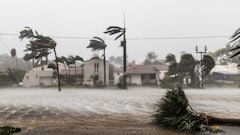
Despite the rising frequency and severity of disruptions, 76% of executives lack confidence in their crisis readiness, and only 24% feel adequately prepared. Even in high-risk regions, just 13% of organizations have active disaster plans. This lack of preparedness is costly: 95% of organizations have experienced financial losses during crises, according to Samsara’s State of Connected Operations Report—Plan, Act, Recover: Disaster Preparedness in Physical Operations report.
“Every day, we partner with the organizations that keep our world running—the people on the front lines of everything from wildfires and hurricanes to cyberattacks and supply chain disruptions,” says Johan Land, SVP of product at Samsara. “This study makes clear that the biggest threat isn't the disaster itself—it’s being unprepared. The ultimate operational unlock is moving from reacting to a crisis to predicting its impact. That's why we're so focused on using AI to help build more resilient operations, so leaders can act before the next crisis hits and keep their teams safe."
Key takeaways:
- 76% of executives lack confidence in their crisis readiness; only 24% feel adequately prepared.
- Just 13% of organizations in disaster-prone areas have active crisis plans, including just 1% in Canada, 3% in Mexico, and 10% in France.
- Organizations cite natural disasters, supply chain disruptions, and civil unrest/security incidents as their top concerns.
- 95% of organizations have suffered financial losses during crises, most often from being unable to locate critical assets.
- 72% described those losses as moderate to severe; only 4% reported no financial impact.
- 64% lack consistent real-time access to key data during emergencies.
- 72% worry current technology does not adequately protect frontline workers.
- 79% fear losing communications if infrastructure is compromised.
- 89% of leaders believe AI will fundamentally reshape disaster response within five years.
- Leaders want technology to improve emergency planning, early warnings, and real-time decision support.
- 79% say their frontline teams are not adequately trained to use digital tools during crises.
- 82% say more frequent disasters are forcing new training needs, particularly in data and technology.
- 93% of organizations with active emergency plans return to normal operations within three days of a major event.




















